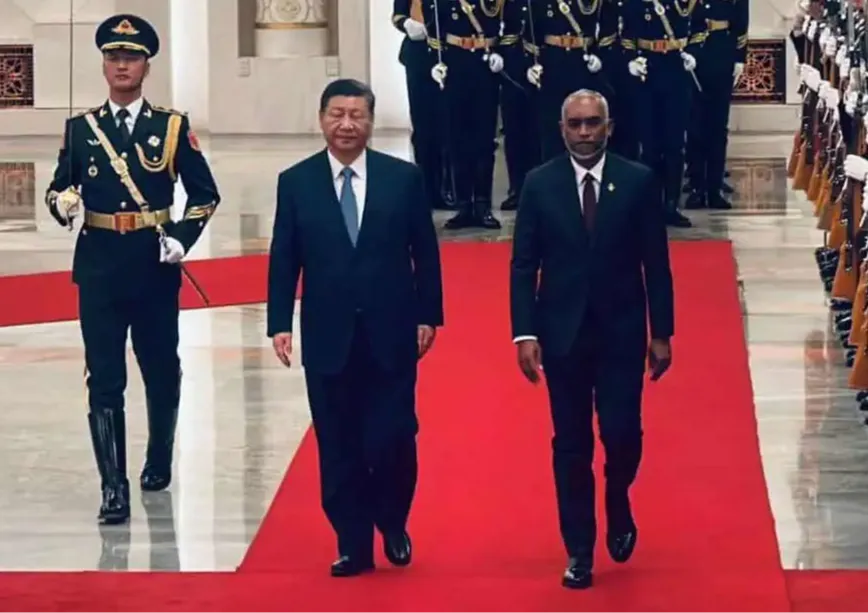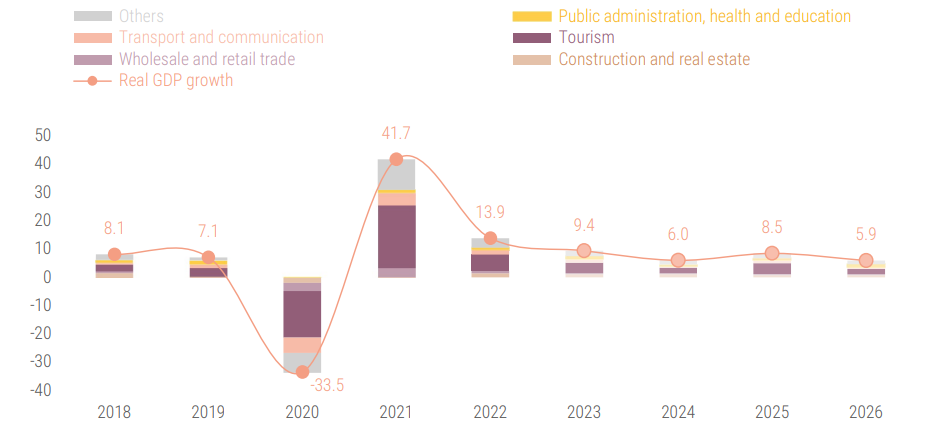
In November 2017, the Maldives Parliament approved the China-Maldives Free Trade Agreement (FTA), making it the second country in South Asia, after Pakistan, to enter into such an agreement with China. The FTA negotiations commenced in 2015 and concluded in September 2017. As the 16th FTA signed by China, it holds special significance as Maldives' first bilateral FTA with a foreign country, reflecting the growing economic cooperation between the two nations. The agreement encompasses trade in goods and services, and it categorises Chinese imports into Maldives into three segments.
The Chinese ambassador emphasised the potential enhancement of Maldivian products, particularly fish, through the Maritime Silk Road initiative.
Despite some Opposition boycotts, the Maldivian Parliament's approval aligns with China's broader economic engagement strategies, contributing to the evolving trade dynamics for the Maldives since 2015. The Chinese ambassador emphasised the potential enhancement of Maldivian products, particularly fish, through the Maritime Silk Road initiative. However, concerns have been raised about transparency and potential geopolitical risks associated with the rushed approval process. The Opposition party, the Maldivian Democratic Party (MDP), called for the suspension of FTA implementation until a proper feasibility study is conducted, addressing both economic and geopolitical considerations.
The Maldivian economic landscape
With its economic output standing at approximately US$ 7 billion, the Maldives' economy is highly reliant on imports and is predominantly fuelled by the tourism industry. The forecast for the economy shows sustained growth in 2023 and 2024, with expectations of welcoming 1.8 million tourists in the fiscal year 2023. This vigorous resurgence in tourism is largely due to the resumption of tourism activities from China and the revitalisation of the Russian market.
Figure 1: Maldives’ GDP Composition by Sector

Source: Ministry of Finance, Government of Maldives
The construction and real estate sectors are also vital, driven by the demand for infrastructure and luxury real estate, which in turn stimulate growth in various ancillary industries. On the sustainability front, food security remains a critical challenge due to the country's dependence on imports and limited arable land, necessitating efforts to enhance local agricultural production and sustainable fishing practices. Balancing these sectors, while ensuring environmental sustainability, is crucial for the Maldives' economic resilience and development. Thus, an exploration of these sectors is necessary to analyse the medium-term trajectory of the Maldives economy.
The Maldives’ GDP is mostly driven by tourism. Although tourist footfalls increased significantly in 2022, they still have not reached pre-pandemic levels. However, with the signing of the FTA and the resurgence of Chinese outbound tourism, Maldives expects the tourist footfall to grow, stimulating economic growth. As flight operations from China continue to restart, a significant increase in tourist arrivals is anticipated to extend into 2024, bolstering the sector. The government’s role in development is paramount, underscoring the need for healthy streams of government revenue. Most of the government’s tax revenue is in the form of Tourism Goods and Services Tax (TGST), which shot up with the rise in tourist footfall since 2021, also a reason for optimism about the FTA. Nonetheless, there is a risk of a subsequent economic decline, potentially triggered by predictions of reduced global GDP, which could lead to a contraction in the tourism industry. Beyond economic shocks, it is also easily affected by climate change and is estimated to be a victim of global warming by 2050.
The government’s role in development is paramount, underscoring the need for healthy streams of government revenue.
- Construction and real estate
After tourism, the transport and communication and the construction and real estate sectors play the largest role in value addition. In 2022, the construction sector failed to meet its target growth result because of decreased trade and a global slowdown in the sector’s activity. The revival of the FTA would imply cheaper construction inputs, making the industry more competitive and allowing it to exhibit robust expansion, which can drive all-round economic growth. Moreover, this can generate employment in the construction sector, which exhibited a positive trend, in the aftermath of the pandemic. However, the Maldives population is mostly rural and employed informally in the tourism sector. To enhance manufacturing output, there is also a need for upskilling of workers which can be achieved through skill development programmes and enrolment in vocational training centres. This again highlights the importance of Indian ties with Maldives, and India’s development funding which has already been disbursed in favour of youth development programmes.
- Food security and trade balance
The country’s dependence on imports for food makes it prone to supply chain disruptions—a major concern for the government. The country must adopt relatively inward-looking policies to secure its interests in a growingly tumultuous global environment. Special attention should be paid to agriculture and industry, promoting their growth through incentivisation schemes. However, the high import bill makes it difficult for the country to stimulate its GDP. In the face of this, the FTA with China will further exacerbate the balance of payments deficit, pushing the country to borrow more. China, as a generous ally, would extend debt, possibly at lower costs than international organisations but with alarming caveats. India, on the other hand, can continue to maintain amicable relations, ensuring development cooperation and undertaking capacity building, given that it is guaranteed fair recognition as an ally.
China, as a generous ally, would extend debt, possibly at lower costs than international organisations but with alarming caveats.
Conclusion
In the medium run, the Maldives economy can experience steady growth fuelled by the tourism sector, which remains the focal point of its economic prosperity. Concurrently, the construction and real estate sectors are expected to thrive, buoyed by the demand for infrastructure and luxury accommodations, which not only support direct economic activity but also stimulate ancillary industries. However, the China-Maldives FTA coupled with the worsening of Maldives-India ties can significantly dampen the economic prospects of the industrial resurgence. With a large decline in import duty collection and imposition of high levels of debt, Maldives can soon find itself in a precarious position. The simultaneous withdrawal of Indian economic support will further compromise their prosperity, especially in terms of food security—where India is a major global supplier. Thus, Maldives needs to rethink its priorities and take active action, to facilitate economic growth in the long run. A balanced approach, leveraging the strengths of each sector while addressing its foreign policy diplomacy, can position the Maldives for sustained economic development.
Arya Roy Bardhan is a Research Assistant at the Centre for New Economic Diplomacy at the Observer Research Foundation.
Soumya Bhowmick is an Associate Fellow at the Centre for New Economic Diplomacy at the Observer Research Foundation.
The views expressed above belong to the author(s). ORF research and analyses now available on Telegram! Click here to access our curated content — blogs, longforms and interviews.





 PREV
PREV



